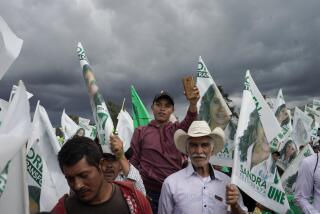To Meddle in Managua? : Bipartisanship Is Tested Over U.S. Role in February Election
- Share via
Before Congress left for summer vacation, the Democratic majority on the House Intelligence Committee was poised to ban CIA involvement in Nicaragua’s election next February. The committee intended to add the ban to the legislation that authorizes funding for the intelligence community starting on Oct. 1. But at the eleventh hour, Secretary of State James A. Baker III successfully appealed to committee chairman Anthony C. Beilenson (D-Los Angeles) to delay the vote until after the recess. The Administration, Baker said, was eager to avoid a confrontation.
Now Congress is back, and Baker and his aides will be meeting behind the scenes with Beilenson and other intelligence committee Democrats to see whether this latest pitfall on the path to bipartisanship can be avoided. It will be a tough negotiation.
Democrats had enough votes to pass the ban in July, and events in the interim have stiffened their resolve. The five Central American presidents, meeting in Tela, Honduras, in August, called on outside powers not to interfere covertly in the Nicaraguan campaign. Moreover, all 20 opposition parties in Nicaragua--the potential recipients of the CIA’s largess--repudiated covert assistance in a landmark agreement on electoral procedures that they signed with the Sandinistas that same month.
Baker also must bear the burden of distrust that Ronald Reagan and the late William Casey, director of the Central Intelligence Agency, left as their legacy. Casey lied to the intelligence committees so frequently and so audaciously that skeptical Democrats will want a prohibition on covert action written in black and white, and preferably written into the law.
Baker will try to talk them out of that, both to preserve the principle of presidential discretion in intelligence matters and to give Bush the flexibility to respond to unforeseen circumstances.
Democrats, however, worry that unless the ban is in the law, there is nothing to prevent President Bush from later launching a covert operation targeted at the election and paying for it out of the CIA’s contingency fund. Although Bush would have to sign a presidential “finding” justifying such action and inform the intelligence committees “in a timely fashion” (though not, perhaps, before the election), the committees have no power to approve or disapprove. Once the intelligence bill for next year is completed, Congress will have lost its leverage.
To be sure, Baker’s word is far better currency on Capitol Hill than Casey’s ever was. If Baker gives a solemn promise that the CIA will not try to influence Nicaragua’s election, many members will be inclined to trust him. The Democrats are no more eager than the White House to begin fighting over Nicaragua again. Unless Baker is willing to promise at least that much, there won’t be much ground for compromise. If no agreement is reached, the stage will be set for another bruising public debate over Nicaragua, shattering the spirit if not the letter of the bipartisan agreement reached in March.
The Republican right is already berating Bush and Baker for selling out the Contras because they chose not to fight Congress to the death over military aid last winter. As Baker meets with Beilenson, he will have to be watching his right flank. To make a prohibition on CIA involvement in the Nicaraguan election palatable to the right, Baker will probably want to trade it for a sizable increase in overt aid to the Nicaraguan opposition.
Congress has already allocated $3.5 million in overt aid through the National Endowment for Democracy. Unlike covert aid, such assistance is legal under Nicaragua’s election law. But even overt aid can be manipulative if there is too much of it. In Nicaragua’s moribund economy, a few dollars go a long way. On a per-capita basis, the $3.5 million is 12 times more than Washington provided the Chilean opposition in last year’s plebiscite on the Pinochet regime.
Although most Democrats are not opposed in principle to overt aid in foreign elections, many would resist sending much more to Nicaragua than has already been approved. We do the Nicaraguan opposition no favor by making it appear to be bought and paid for by the U.S.A.
The negotiation between the Administration and the House Intelligence Committee will be the first real test of whether President Bush’s professed desire for a bipartisan policy on Nicaragua is sincere. It will also be a trial run for the much more complicated consultations that must occur in November when Contra aid comes up for congressional review. For the moment, both Congress and the Executive are observing the truce in their war over Nicaragua. We will soon know if that truce can be translated into a permanent peace or is merely the prelude to new hostilities.
More to Read
Sign up for Essential California
The most important California stories and recommendations in your inbox every morning.
You may occasionally receive promotional content from the Los Angeles Times.













